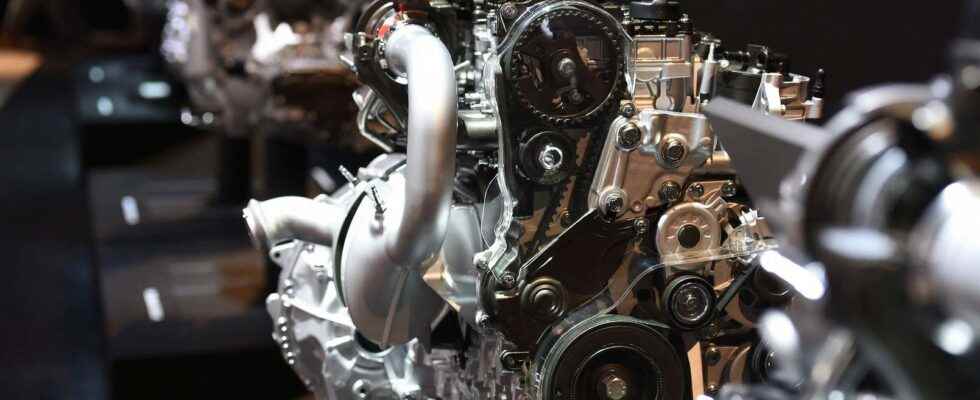The COP26 which ends in Glasgow was an opportunity to take stock of the electrification strategy of the main car manufacturers who are more or less in a hurry to switch to 100% electric ranges.
About thirty countries and several manufacturers automobiles pledged Wednesday at COP26 in Glasgow to “work” to ensure that by 2040 all new cars sold are zero emission. Many manufacturers had, however, already made a radical commitment to the electric shift, by promising to do away with gasoline engines. combustion of their range sometimes as early as 2030, or to gradually reduce their share in their production. Here are their calendars.
Ford
Ford is among the signatories of the declaration unveiled Wednesday in Glasgow.
The group had already announced the creation of four factories dedicated to electric vehicles in the United States, as part of its $ 30 billion electrification plan.
The American manufacturer expects 100% of its sales to be entirely electric by 2030 in Europe (40% to 50% globally).
Volvo
Volvo Cars, also a signatory in Glasgow and a subsidiary of Chinese Geely, plans to withdraw from its catalog by 2030 all its combustion models, including hybrids.
Polestar, the young electric brand from Geely and Volvo, has announced its intention to go public to accelerate its global expansion.
Stellantis
The group that brings together PSA (Peugeot, Citroën, Opel) and FCA (Fiat, Chrysler) have abandoned the development of combustion engines and intends to invest 30 billion euros in the electrification of its ranges by 2025 and in software.
The DS and Lancia brands will go 100% electric from 2024 and 2026, respectively. Alfa Romeo will be 100% electric in Europe and North America by 2027, Opel in Europe by 2028.
Fiat will also become so “as soon as the price of electric cars approaches that of thermals”, ie between 2025 and 2030.
Volkswagen
The german giant Volkswagen aims for world leadership in electric cars. Launched at the end of 2020, its compact ID.3 is already fighting with You’re here to dominate the European electricity market.
Volkswagen expects to sell 50% of electric vehicles by 2030 and “almost 100%” by 2040 in its main markets.
He plans to invest 73 billion euros in five years in his electric shift. Like You’re here, the group intends to install a large network of fast charging stations around the world.
Its luxury brand Audi will be 100% battery-powered in 2033. Lamborghini, which also belongs to the German giant, intends to electrify its entire range of sports cars with hybrids by the end of 2024 and to offer a 100% electric sports car around 2027.
Daimler
The German group Daimler will invest 40 billion euros in the electrification of its production during the decade.
From 2025, Mercedes will only launch 100% electric “architectures” (technical basis of a vehicle that accommodates engine, wheels and chassis). Mercedes-Benz is one of the signatories to COP26.
Jaguar Land Rover
To reimagine its range, Jaguar Land Rover, a subsidiary of the Indian group Tata and also a signatory in Glasgow, will invest 2.5 billion pounds (2.8 billion euros) per year, largely in electricity. The sportswomen of Jaguar will be 100% electric from 2025.
Renault
Electric pioneer with its Zoé, the group Renault targets more than 65% of electrified vehicles by 2025. It will launch ten new battery-electric vehicles by 2025, including a modern and “accessible” version of the iconic Renault 5, made in France.
Bmw
Over the next ten years, the German manufacturer Bmw wants to sell ten million 100% electric models, against more than 4 million previously announced. Its subsidiary Mini will completely run the back to combustion engines in ten years.
GM
American General Motors, a signatory to COP26, already intended to no longer build cars with polluting emissions by 2035, even if it did not openly commit to offering only electric vehicles in 2035.
Toyota
The pioneer of hybrid cars Toyota, which did not believe in battery-powered cars, will finally launch fifteen 100% electric models by 2025.
Toyota plans to achieve 10% of its sales in electric and hydrogen by then, alongside 70% hybrids, 10% plug-in hybrids and 10% gasoline cars.
Hyundai-Kia
Korean Hyundai plans to present 23 models of electric vehicles by 2025 and distribute more than one million units. Kia will present its side seven electric models by 2026, which should reach 20% of its global sales.
—
Discover TechPod, the bimonthly summary of tech and mobility news!
—
Interested in what you just read?
.
fs8
